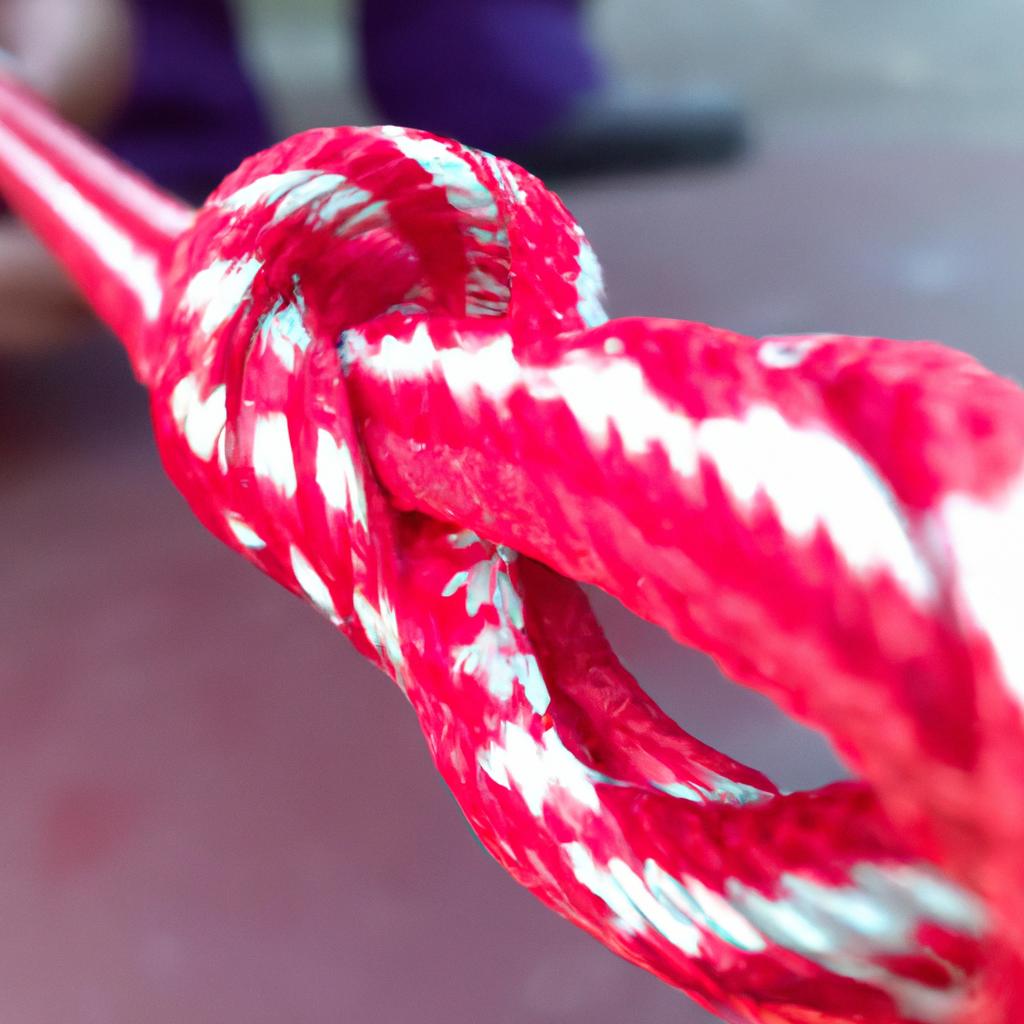As an outdoor and climbing enthusiast, I’m here to tell ya that yes, it does. But why and how much? Well, let me explain the ins and outs of nylon rope stretching in a bit more detail.
Yes, nylon rope does stretch. It has a high degree of elasticity, which allows it to absorb shock loads effectively.
Nylon rope can stretch up to 15-30% of its original size before the fibers start to break, and its stretch properties are affected by rope thickness, moisture levels, blends, temperature and other factors.
This property makes it ideal for applications like towing, mooring, and anchoring. However, the stretch can also be a disadvantage in some situations, as it may cause the rope to lose tension or become difficult to handle.
To minimize unwanted stretching, consider factors like the rope’s diameter, construction, and intended use, and choose a rope with appropriate specifications for your specific needs.
Nylon rope is popular among climbers and adventurers alike due to its strength, durability, and low stretchability. It’s also resistant to abrasions and UV rays which makes it ideal for all kinds of outdoor activities.
So whether you’re looking for something to secure your sailboat or rappelling down a cliff face, nylon ropes are sure to hold up under pressure.
Properties Of Nylon
Nylon rope is an incredibly versatile tool, and its properties are what make it so useful. Its tensile strength makes it ideal for knots and knots that need to hold a lot of weight. Stretch testing shows how much the rope can be stretched before breaking and environmental factors like temperature and humidity also play into this number.

Additionally, nylon has great abrasion resistance which helps keep the integrity of your ropes intact even in rough conditions. The durability of nylon comes at no surprise when considering all these features; with good care you’ll get years out of any piece of nylon rope you own.
But there is still more to consider than just the basic properties – different types of nylon have specific uses based on their construction that will help guide your decision-making process. Now let’s take a closer look at the various kinds…
Types Of Nylon Rope
When it comes to nylon rope, there are different weaves and breaking strengths to consider. It’s important to know which one is right for the job, otherwise you could be in a pickle!
Different Weaves
When it comes to nylon rope, the type of weave you choose can make a huge difference.
Whether you’re an outdoorsman looking for something that won’t break under pressure or an experienced knot-tyer who needs maximum strength and durability, various weaves offer different benefits.
Sheathing materials like polyester provide greater abrasion resistance while 3-strand ropes are easy to splice and have higher breaking strengths than other types.
For secure knotting techniques, kernmantle is preferred as it has both an inner core and outer sheath that add extra tensile strength.
So when choosing your nylon rope, don’t forget to consider the weave!
It could be the deciding factor in how successfully you complete your project.
Breaking Strength
When it comes to nylon rope, breaking strength is a major consideration. Knowing the knot strength and breaking points of your rope can ensure that you’re prepared for whatever outdoor challenge life throws at you.
And if environmental impact matters to you, some materials offer more sustainability than others – so don’t forget to factor that in too!
With all these things in mind, there’s no reason not to find a rope that fits your needs perfectly.
So let the adventure begin!
Factors Affecting Stretch
When examining the stretch of nylon rope, two key factors to consider are the type of nylon used and the length of the rope. Nylon’s strength and elasticity vary depending on its composition, so it’s important to know what kind you’re working with. Additionally, the longer the rope, the greater its stretch capacity.
Type Of Nylon
When choosing a nylon rope for an outdoor application, there are several factors to consider. The type of nylon is especially important as it affects the durability ratings, breaking strength and UV resistance.
Nylon 6 and Nylon 66 are two popular varieties used for ropes due to their impressive strength-to-weight ratios and abrasion resistance. Nylon 6 has excellent elasticity and shock absorption properties while offering superior knot retention; however, its UV resistance can be poor compared to Nylon 66 which offers better protection against sunlight degradation.
Ultimately, each type of nylon comes with its own advantages that should be taken into account when selecting your rope so you get the best performance in any situation.
Length Of Rope
So, now that we’ve covered the type of nylon to use for outdoor applications, let’s talk about rope length.
It’s important to take safety precautions and consider what tension ratings and breaking points your rope will be subjected to when determining the best size for your job.
Knowing the maximum force a rope can withstand is critical in ensuring its strength and stability throughout its life-cycle.
That’s why it pays off to invest in ropes with longer lengths as they’ll give you more versatility so you can adjust the tension through different knots without having to worry about snapping or fraying at breakpoints.
With this knowledge under your belt, you’re ready to tackle any project no matter how big or small!
Measuring Rope Stretch
It’s no surprise that nylon rope can stretch – after all, many other materials do as well. However, the degree of its stretchability is dependent on several key factors such as tensile strength, breaking load, and storage conditions.
Interestingly enough, a single strand of nylon rope can be stretched up to 20% before it breaks! This means that if you’re looking for a sturdy material that won’t easily give way under pressure, then this would be an ideal choice.
The rate at which nylon rope stretches varies depending upon different weather conditions. For instance, in hot climates where temperatures are high throughout the day, the stretch rate may increase considerably compared to cooler climates.
It’s important to keep this in mind when choosing nylon rope for your next project or activity so that you don’t end up with something that isn’t suitable for the environment in which you’ll be using it.
Additionally, if stored correctly – preferably away from direct sunlight – the stretching capacity of the rope will remain intact over time.
Whether you’re planning a camping trip or simply need some extra security around your house, nylon rope provides flexibility and reliability like no other material out there. With its impressive strength and ability to stay strong even under extreme weather conditions, it’s definitely worth considering for any outdoor endeavor!
Frequently Asked Questions
What Is The Most Common Type Of Nylon Rope?
When it comes to the most common type of nylon rope, there are a few factors that should be considered.
Knotting techniques and durability testing can give you an indication as to how strong your rope is.
The diameter of the rope also affects its breaking strength and weatherproofing capabilities – thicker ropes will generally last longer in harsh conditions.
Ultimately, depending on what you’re using your rope for, you’ll want to make sure you find one that’s up to the task!
How Much Strength Does Nylon Rope Have Compared To Other Types Of Rope?
When it comes to rope strength, nylon is one of the most reliable materials used by outdoor adventurers. This type of rope has been tested for its tensile strength and durability, withstanding shock loading and knot tying without breaking points.
In comparison to other types of rope, nylon offers superior performance when it comes to safety and reliability in extreme conditions. It’s a great choice for anyone who enjoys the freedom of taking on their favorite outdoor activities with peace-of-mind knowing that they have chosen one of the strongest ropes available.
What Is The Best Way To Store Nylon Rope?
As an outdoor expert, I understand the importance of storing nylon rope properly to ensure it remains strong and flexible.
To best protect your rope from UV damage and wear-and-tear, store it in a cool, dry place away from direct sunlight.
Additionally, when coiling or tying knots in the rope be mindful of stretching limits and knot types that won’t result in unnecessary strain on the fibers.
Regular maintenance is key for maintaining flexibility over time; inspect regularly for fraying and replace as needed.
By following these tips you can rest assured knowing your rope will remain safe and secure during any adventure!
How Do You Know If Nylon Rope Has Been Overstretched?
Knowing if your nylon rope has been overstretched is key to keeping it safe and effective.
As an outdoor expert, I recommend identifying the signs of a stretched rope by examining its types of knots, knot strength and stretching methods used.
To further assess the situation, try cleaning solutions on the rope; these can help you identify any weak points or tears that may have occurred due to overextension.
Don’t let yourself get tied up in knots – keep your gear strong and reliable so you can focus on enjoying freedom!
What Is The Best Way To Secure A Knot In Nylon Rope?
When it comes to securing a knot in nylon rope, there are many techniques to choose from.
Outdoor experts recommend using knots that provide the best length variation and durability testing for weather protection. For example, square knots or double half hitches can be used as they both offer secure tying and hold up well against wear and tear due to their interlocking capabilities.
Additionally, these knots typically don’t slip even when exposed to wet conditions.
With proper knot-tying knowledge, anyone can achieve reliable security in any type of nylon rope – no matter how much it stretches!
Conclusion
Nylon rope is an essential item for any outdoor enthusiast. It’s strong and versatile, making it perfect for a variety of situations. And the best part? Nylon rope does stretch, which can make all the difference when you’re in tight spots or need extra length.
When storing nylon rope, be sure to keep it out of direct sunlight and away from moisture; this will help ensure that it doesn’t become brittle over time.
To secure knots quickly and easily, use a figure-eight knot–it won’t slip or come undone unexpectedly!
Finally, if your nylon rope has been stretched too far, look for signs like fraying edges or visible thinning along its length.
I’ve used nylon rope countless times on my adventures outdoors and I’m always amazed at just how durable and reliable it is. With proper storage techniques and careful observation while tying off knots, you can trust that your nylon rope will have plenty of life left even after repeated uses.





